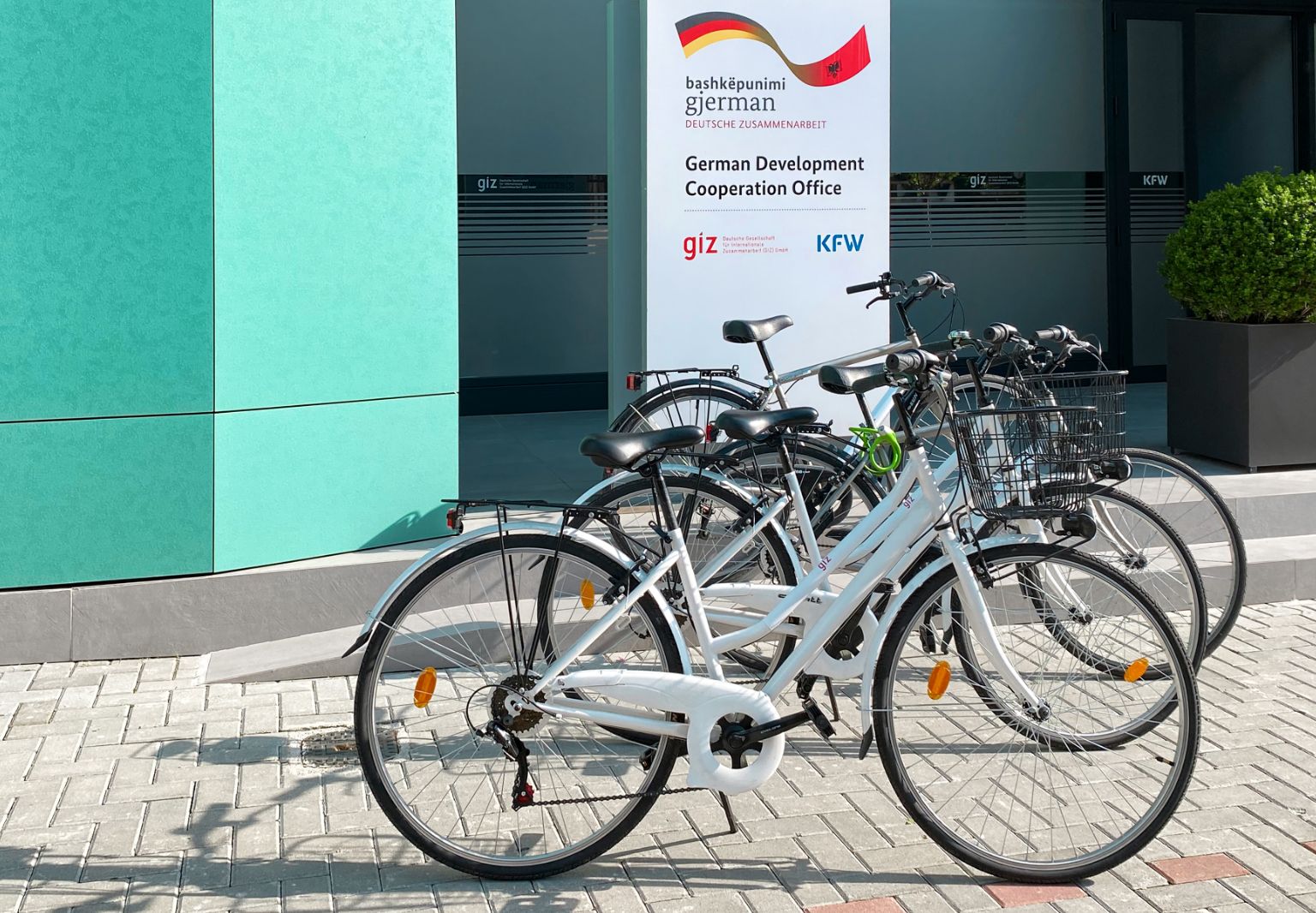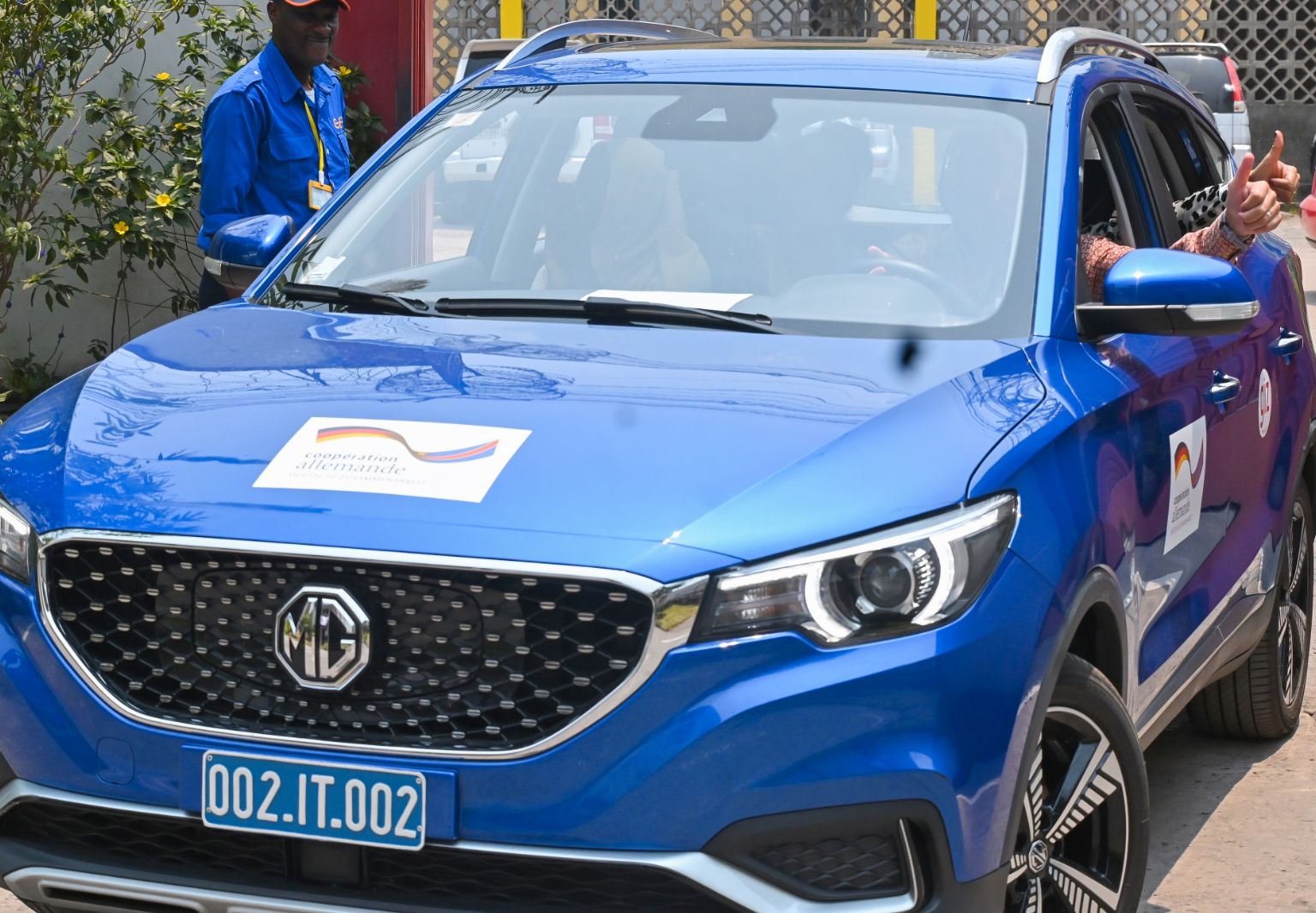GIZ staff in Albania cover over 1,000 km a month by electric scooter. This impressive tally is one of the achievements of the changes to GIZ’s mobility management in Albania. To reduce greenhouse gas emissions in the mobility sector, GIZ Albania has adopted a whole raft of measures in keeping with the principle of ‘Avoid-Shift-Improve’. All staff agreed not to use cars for work-related journeys of less than one and a half kilometres. To make that work in practice, electric scooters and company bicycles were procured, and bike stands installed at GIZ’s Tirana office. Close monitoring of all business travel also identified potential for pooling car journeys and using the smallest vehicle possible in all cases. All in all, GIZ Albania managed to save about two tonnes of greenhouse gases in the mobility sector in 2022.
Reducing emissions,mitigating climate change
Fewer business trips, new electric vehicles and environmentally sound air-conditioning units – GIZ is taking action around the world to achieve the ambitious climate targets it has set itself.

With projects like mobility management in Albania, GIZ locations round the globe are helping achieve GIZ’s climate goals. Overall emissions are to be reduced as far as possible by 2025 to make an active contribution to achieving the objectives of the Paris Agreement on climate change. In 2021, GIZ was one of the first development organisations to sign up for the global Science Based Targets initiative (SBTi). This means it is pursuing ambitious reduction targets that are broken down into various categories of emission source, termed scopes, in line with international directives. We are taking various steps at all of our locations to move towards these targets.
Switching to electric vehicles is one important factor in the field of mobility, for example. GIZ’s Kinshasa office in the Democratic Republic of the Congo, for instance, has managed to procure an electric vehicle in spite of the many challenges this involved. The country does not yet have a charging infrastructure and no electric vehicles are available on the local market, but the office was able to install its own charging point. In September 2022, it took delivery of its first electric vehicle which has a range of up to 440 kilometres.
All in all, GIZ’s emissions in Scopes 1 and 2 in 2022 were twelve per cent lower than 2019. The switch from natural gas to biomethane inside Germany played no small part in this. Outside Germany, the use of electric cars and the installation of PV systems were important measures. Wherever possible, energy-efficient and environmentally sound air-conditioning systems have been procured. GIZ has also held special events at several locations to raise the awareness of staff in the field of energy and resource consumption.
With regard to indirect emissions along the value chain (Scope 3), significant savings have been made in terms of business travel in particular. Emissions caused by business trips dropped by 34 per cent in 2022 as compared to 2019. This was made possible by new guidelines on the reimbursement of travel expenses and new opportunities for online cooperation. Staff are also given guidance to make them aware of how to make air travel as CO2-efficient as possible and on whether the trip is in fact necessary.
You will find more information on the principles of our climate management and our emission reduction in various sectors in the GRI Index under ‘Material topic 1: Climate protection’.

Below you will find information about the Global Reporting Initiative’s (GRI) sustainability standards:
Material topic 1: Climate protection
| GRI | UNGC | SDG | DNK | ||
|---|---|---|---|---|---|
| 3-3 | Management approach disclosures |
Foundation
Climate management at GIZ Avoiding emissions is our top priority |
8, 9 | 11, 13 | 13 |
| GRI | UNGC | SDG | DNK | |||||||||||||||||||||||||||||||||||||||||||||||||||||||||||||||||
|---|---|---|---|---|---|---|---|---|---|---|---|---|---|---|---|---|---|---|---|---|---|---|---|---|---|---|---|---|---|---|---|---|---|---|---|---|---|---|---|---|---|---|---|---|---|---|---|---|---|---|---|---|---|---|---|---|---|---|---|---|---|---|---|---|---|---|---|---|
| 305-1 | Direct GHG emissions (Scope 1) |
[1] Due to improved data quality, these figures partly deviate from previously published data. [2] Emissions from electricity were calculated using the market-based method domestically. |
7-9 | 8, 13 | 13 | |||||||||||||||||||||||||||||||||||||||||||||||||||||||||||||||
| 305-2 | Indirect energy-related GHG emissions (Scope 2) |
[1] Due to improved data quality, these figures partly deviate from previously published data. [2] Emissions from electricity were calculated using the market-based method domestically. |
7-9 | 8, 13 | 13 | |||||||||||||||||||||||||||||||||||||||||||||||||||||||||||||||
| 305-3 | Other indirect GHG emissions (Scope 3) |
[5] Estimate based on financial data. These are only emissions from purchased services since these are essential for GIZ. This excludes construction services. [6] Due to improved data quality, figures may differ in part from previously published data. An estimate was made for foreign countries for the years 2019 and 2020. [7] Commuter traffic abroad was roughly estimated for 2019 using flat-rate values. From 2020, the values are derived from an extrapolation based on the results of an internal survey of selected locations abroad. |
7-9 | 8, 13 | 13 | |||||||||||||||||||||||||||||||||||||||||||||||||||||||||||||||
| 305-5 | Reduction in GHG emissions |
Direct and indirect GHG emissions from buildings and vehicles are down by about 12 per cent on 2019. Indirect emissions from the upstream and downstream value chain have decreased by roughly 6 per cent.
[8] The totals deviate in part from previously communicated figures because data quality has improved thanks to more accurate recalculations. |
7-9 | 8, 13 | 13 | |||||||||||||||||||||||||||||||||||||||||||||||||||||||||||||||
| 305-7 | Nitrogen oxides (NOx), sulphur oxides (SOx) and other significant airborne emissions |
[9] Data for 2020 and 2021 have been recalculated based on new data. |
7 | 8, 13 | 13 | |||||||||||||||||||||||||||||||||||||||||||||||||||||||||||||||